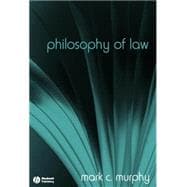
Mark C. Murphy is Professor of Philosophy at Georgetown University, where he works in moral, political, and legal philosophy. He is the author of Natural Law and Practical Rationality (2001), An Essay on Divine Authority (2002), and Natural Law in Jurisprudence and Politics (2006), and the editor of Alasdair MacIntyre (2003).
| Acknowledgments | |
| Introduction | |
| Philosophy, the Familiar, and the Unfamiliar | |
| What Are Our Commonplaces About Law? | |
| The Course of Our Inquiry | |
| For Further Reading | |
| Analytical Fundamentals: The Concept of Law | |
| The Question, and its Importance | |
| Basic Austinianism | |
| Positivist Lessons | |
| Hartian Positivism | |
| Interlude: Hard and Soft Positivisms | |
| Natural Law Theory | |
| FullerÆs Procedural Natural Law Theory | |
| AquinasÆs Substantive Natural Law Theory | |
| A Suggested Resolution | |
| Appendix: Why is it Called ôNatural Law Theoryö? | |
| For Further Reading | |
| Normative Fundamentals: The Basic Roles of Paradigmatic Legal Systems | |
| What are the Basic Roles of Paradigmatic Legal Systems? | |
| The Role of Subject | |
| The Role of Legislator | |
| The Role of Judge | |
| For Further Reading | |
| The Aims of Law | |
| The Aims of Law and the Common Good | |
| The Harm-to-others Principle | |
| Challenges to the Harm-to-others Principle: Types of Harm | |
| Challenges to the Harm-to-others Principle: The Party Armed | |
| Morals Legislation | |
| For Further Reading | |
| The Nature and Aims of the Criminal Law | |
| Types of Legal Norms | |
| Crime and Punishment | |
| Two Normative Theories of Punishment | |
| Justification and Excuse | |
| For Further Reading | |
| The Nature and Aims of Tort Law | |
| Torts and Crimes | |
| Torts and Damages | |
| Economic and Justice Accounts of Negligence Torts | |
| Elements of the Negligence Tort | |
| Damages | |
| Intentional Torts and Torts of Strict Liability | |
| For Further Reading | |
| Challenging the Law | |
| Putting Legal Roles to the Question | |
| Against the Role of Subject: Philosophical Anarchism | |
| Against the Role of Legislator: Marxism / Feminist Legal Theory / Critical Race Theory | |
| Against the Role of Judge: American Legal Realism / Critical Legal studies | |
| For Further Reading | |
| Index | |
| Table of Contents provided by Publisher. All Rights Reserved. |
The New copy of this book will include any supplemental materials advertised. Please check the title of the book to determine if it should include any access cards, study guides, lab manuals, CDs, etc.
The Used, Rental and eBook copies of this book are not guaranteed to include any supplemental materials. Typically, only the book itself is included. This is true even if the title states it includes any access cards, study guides, lab manuals, CDs, etc.